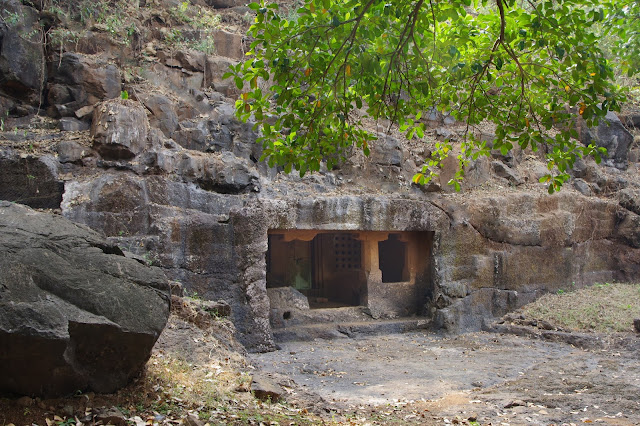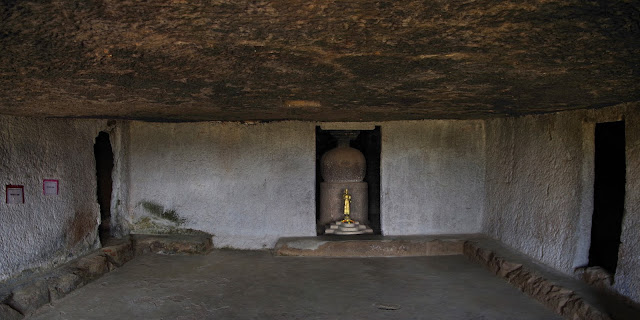Panhalekhaji is a small remote village beside the Kodjai river in Ratnagiri district of Maharashtra. It boasts of a collection of ancient manmade caves dating back to 2 AD. Over time, these caves were lost to civilization. They were re-discovered only in 1972.
Public transport to Panhalekhaji is almost non-existent. A cab is the only option to get there. I had hired a cab from Khed. The first stop after Khed was the hot springs of Unahavare. After an exhilarating dip in the hot springs, I continued the journey to Panhalekhaji. A newly completed dirt road makes the trip from Unahavare a lot shorter. Be prepared for a bumpy, yet beautiful ride.
I am the sole tourist at Panhalekhaji caves. The only other person here is an official from the Archeological Survey of India (ASI). He is happy to fill me in on the details about the cave. The oldest cave is believed to have been made for Buddhist monks in 2 AD. Gradually over the course of time, it expanded into 29 caves. The caves are divided into upper and lower levels. Only the lower level caves are open to tourists.

Over the centuries, these caves were used by Buddhists, Jains and Hindus. Each culture has left their mark on the caves. Some caves are basic. Others have seating arrangements chiseled into the walls. A few others have intricate carvings on the walls. One of caves has an enclosure for holding water. Perhaps, this cave was the residence of a high ranking monk. But the best cave has to be the ‘Kailash’ cave; as it’s called today. The scenes from Mahabharatam are the carved on the roof of this cave. A truly magnificent cave.
I spot an alligator in the Kodjai river that runs adjacent to the caves. The ASI official assures me that the alligators don’t come to this side of the river. After a while, I sit on a large boulder awed by the magnificence of these caves. A cool wind is blowing. The rustling of the dry leaves reminds me of the alligator and I decide to keep walking. Quite a few South Korean Buddhist pilgrims journey here. Yet for most Indians, these amazing caves remain unknown😞
Other blogs from the series
 |
The "Kailash" cave
|
 |
The locking arrangement on the door is still visible
|
 |
I wonder what the cylindrical structure signifies!
|
 |
Time has takes its toll
|
 |
Artwork on the walls
|
 |
Most of the caves are spartan
|
 |
The Kodjai river runs adjacent to the caves. I spotted an alligator in it!
|
 |
| It's a room inside the room: At the Kailash Cave |
 |
One of the smaller, yet luxurious caves. It was perhaps made for a high ranking monk
|
 |
Ganapathi from the Hindu era
|
 |
Some important manuscripts were recovered from this stone
|







































Comments
Post a Comment